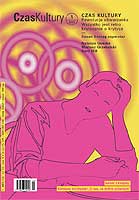Rewolucja obwarzanka - Z Rafałem Grupińskim rozmawia Marek Wasilewski
Marek Wasilewski talks to Rafał Grupiński, the first Chief Editor of Czas Kultury: The Bagel Revolution
Author(s): Marek Wasilewski, Rafał GrupińskiSubject(s): Cultural Essay, Political Essay, Societal Essay
Published by: Stowarzyszenie Czasu Kultury
Keywords: The 20th anniversary of the Czas Kultury; Culture vs. politics; Young talents under the wings of Czas Kultury; The growth of Czas Kultury during the bagel revolution; Czas Kultury as an incentive for other publishers
Summary/Abstract: Czas Kultury [Cultural Times or literarily, Times of Culture] magazine has reached the mature age of 20 years. In 1985 the anticommunist cultural world was extremely political, hence the idea of establishing a periodical that would talk about culture and literature without creating a division between those who were ‘acceptable’ because their works were distributed in underground circles and those who were ‘unacceptable’ because they were doing well in mainstream publications. The focus was on the aesthetic and artistic values of the printed articles without the burden of political considerations. This, however, did not mean that political and social issues were ignored and Czas Kultury made plenty of room for features that reacted strongly to current events. According to Rafał Grupiński, the first Chief Editor of the magazine, the thing which was really important was the ‘political commentary bent’ that made it possible to look at reality in a polemical way without making judgements about what was black and what was white. The truth of this became even clearer after 1989, when critique turned to the literary environments that claimed the exclusive right to being correct and went into ecstasies about the “deliberated writing of memoirs from the internment period, full of pseudo patriotic blah”. Czas Kultury raised its readers’ awareness of the fact that decommunisation would be a complex process and not just a vetting activity. Concurrently the magazine supported the talents of the young generation and organised annual literary competitions with awards for literary debuts. This made it possible to discover numerous writers, for example Adam Wiedemann, Marzanna Kielar, Natasza Goerke and Krzysztof Siwczyk. Additionally, the awards for the most interesting books rediscovered forgotten or ignored authors, for example Stanisław Cichowicz. At the beginning of the 1990’s a turning point occurred in the culture of Poland’s particular regions. This period was known as the ‘bagel revolution’ due to Warsaw’s cultural stagnation and the rapid cultural growth in other regions. This was when the Czas Kultury Library was founded, publishing the novels of writers like Andrzej Stasiuk and Izabela Filipiak, the short stories of Natasza Goerke and the poems of Marcin Świetlicki. The magazine continued to deal with a wide variety of issues, for example Jewish culture, a review of the film Basic Instinct in the light of the neo-gothic novel and BSE or 'mad cow disease'. It is worth noting, that even during the times of communist restrictions, the magazine covered such topics as the history of Tibet and the abortion ban in Ceausescu’s Romania. Despite the fact that many literary and artistic periodicals that were regarded as niche publications now cease to exist, it is today much easier to establish new magazines than it was in the communist times.
Journal: Czas Kultury
- Issue Year: 2005
- Issue No: 01
- Page Range: 04-11
- Page Count: 8
- Language: Polish
- Content File-PDF

